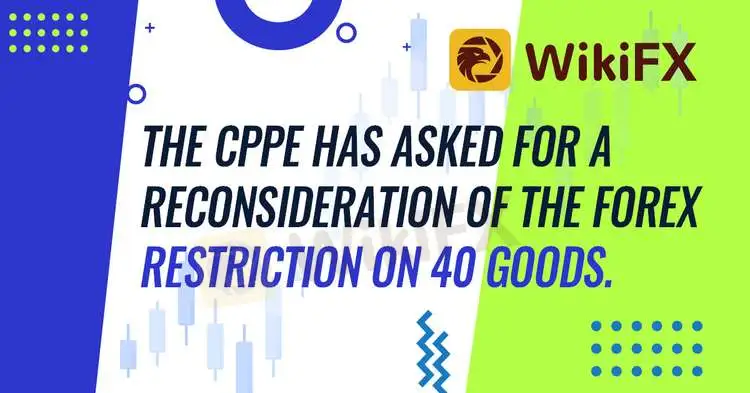简体中文
繁體中文
English
Pусский
日本語
ภาษาไทย
Tiếng Việt
Bahasa Indonesia
Español
हिन्दी
Filippiiniläinen
Français
Deutsch
Português
Türkçe
한국어
العربية
THE CPPE HAS ASKED FOR A RECONSIDERATION OF THE FOREX RESTRICTION ON 40 GOODS.
Abstract:The Centre for the Promotion of Private Enterprise (CPPE) has encouraged the Central Bank of Nigeria to reconsider its restriction on some of the more than 40 commodities for which the regulator has barred importers from obtaining foreign exchange.

The Centre for the Promotion of Private Enterprise (CPPE) has encouraged the Central Bank of Nigeria to reconsider its restriction on some of the more than 40 commodities for which the regulator has barred importers from obtaining foreign exchange.
The organization also criticized the Nigeria Customs Service's decision to reintroduce excise duty on soft drink manufacturers in the nation, calling it ill-timed, insensitive, and unsuitable given the country's current tough economic and commercial conditions.
The Centre, headed by Dr. Muda Yusuf, its Chief Executive Officer, stated this in its recently issued economic and business environment evaluation for 2021 and agenda for 2022.
According to the CPPE, the CBN must involve stakeholders since the existing FX policy regime is harming investors, manufacturers, and other stakeholders.
“In order to lessen the drain on foreign reserves, the CBN has prohibited over 40 goods from access to foreign exchange through the official window,” it stated.
Some of the items on this list are intermediary goods for some manufacturing enterprises, which has harmed some of them. It would be prudent for the CBN to undertake a vigorous dialogue with stakeholders in the New Year in order to evaluate this list.
According to the organization, the CBN should implement a freely floating exchange rate policy regime and enable pricing mechanisms in the forex market to reflect demand and supply fundamentals.
Our proposal is to implement a freely floating exchange rate approach based. We would like to emphasize that this is not a proposal for devaluation. Rather, it is a pricing system that reflects the realities of demand and supply in the forex market. It is a system that is long-term, predictable, and open. It is a policy framework that would eliminate uncertainty and instill investor confidence.

Disclaimer:
The views in this article only represent the author's personal views, and do not constitute investment advice on this platform. This platform does not guarantee the accuracy, completeness and timeliness of the information in the article, and will not be liable for any loss caused by the use of or reliance on the information in the article.
Related broker
Read more

Trader Exposes Unethical Practices by STP Trading
A recent allegation against STP Trading has cast doubt on the firm's business practices, highlighting the potential risks faced by retail traders in an increasingly crowded and competitive market.

FCA Identifies Clone Firm Exploiting Admiral Markets' Credibility
The UK Financial Conduct Authority (FCA) has issued a public warning regarding a fraudulent entity impersonating Admiral Markets, a legitimate and authorised trading firm. The clone firm, operating under the name Admiral EU Brokers and the domain Admiraleubrokerz.com, has been falsely presenting itself as an FCA-authorised business.

Malaysian Man Loses RM113,000 in Foreign Currency Investment Scam
A 57-year-old Malaysian man recently fell victim to a fraudulent foreign currency investment scheme, losing RM113,000 in the process. The case was reported to the Commercial Crime Investigation Division in Batu Pahat, which is now investigating the incident.

FCA Alerts Traders to New List of Unregulated and Clone Brokers
Protect your investments! Learn about unregulated firms flagged by the FCA and discover how WikiFX helps traders avoid scams and choose legitimate brokers.
WikiFX Broker
Latest News
Hackers Charged for $11M Crypto Theft Using SIM-Swaps
Role of Central Banks in the FX Market
FCA Alerts Against Sydney FX
What Makes Cross-Border Payments Easier Than Ever?
Trader Exposes Unethical Practices by STP Trading
Bitcoin Nears $100,000: A Triumph of Optimism or a Warning Sign?
Malaysian Man Loses RM113,000 in Foreign Currency Investment Scam
Mastercard Partners with JPMorgan for B2B Cross-Border Payments
FCA Identifies Clone Firm Exploiting Admiral Markets' Credibility
Coinbase Under Scrutiny Amid Wrapped Bitcoin Delisting Controversy
Currency Calculator


